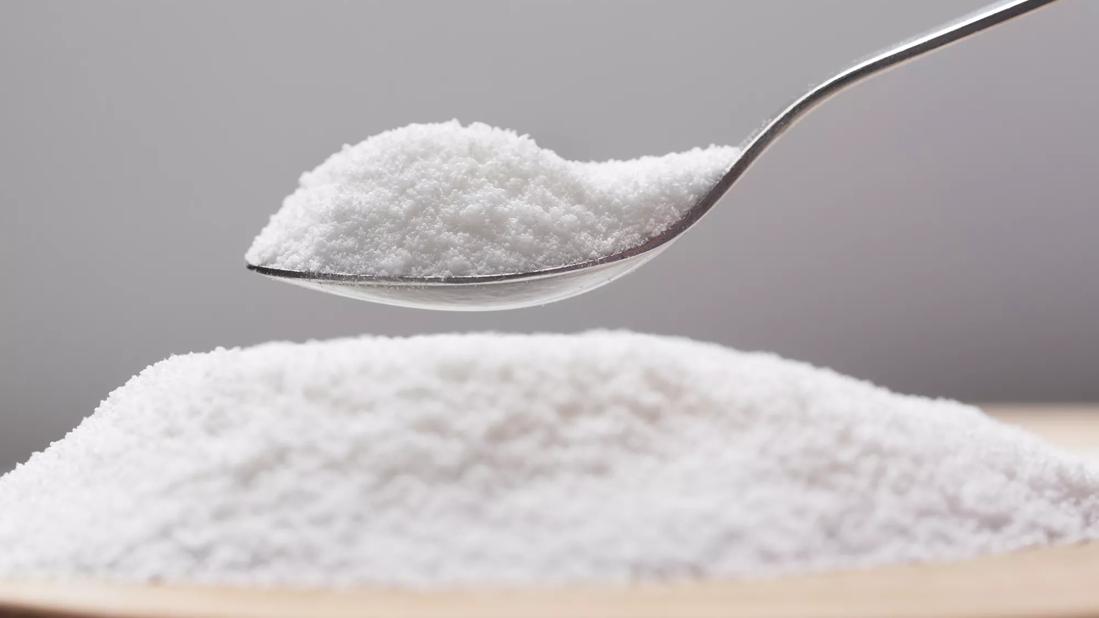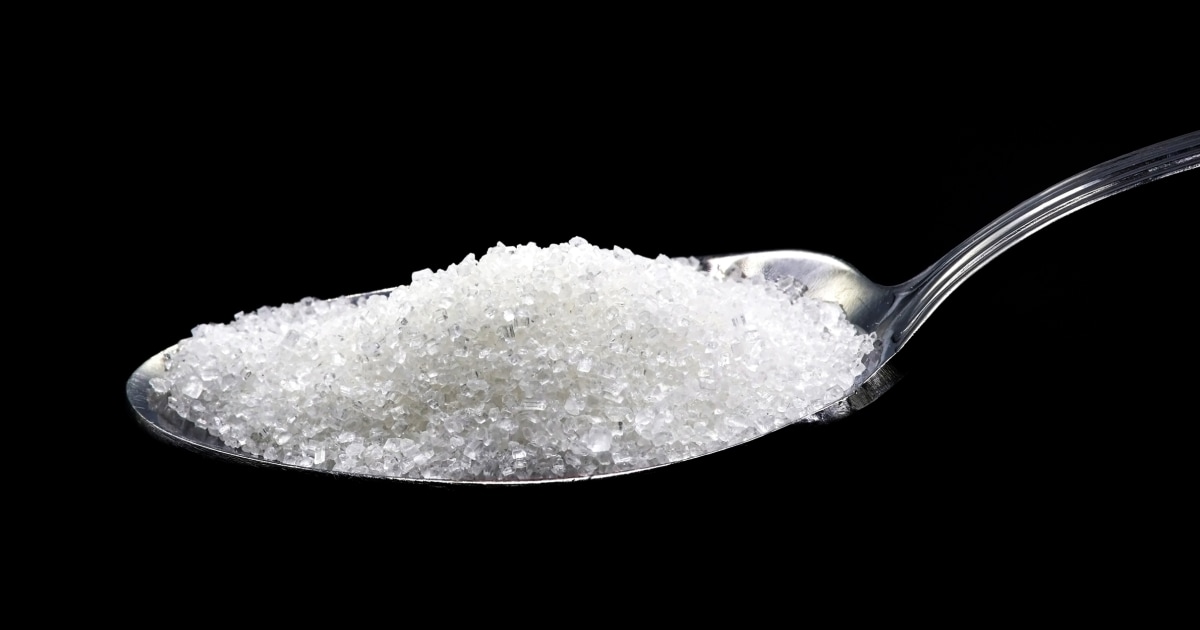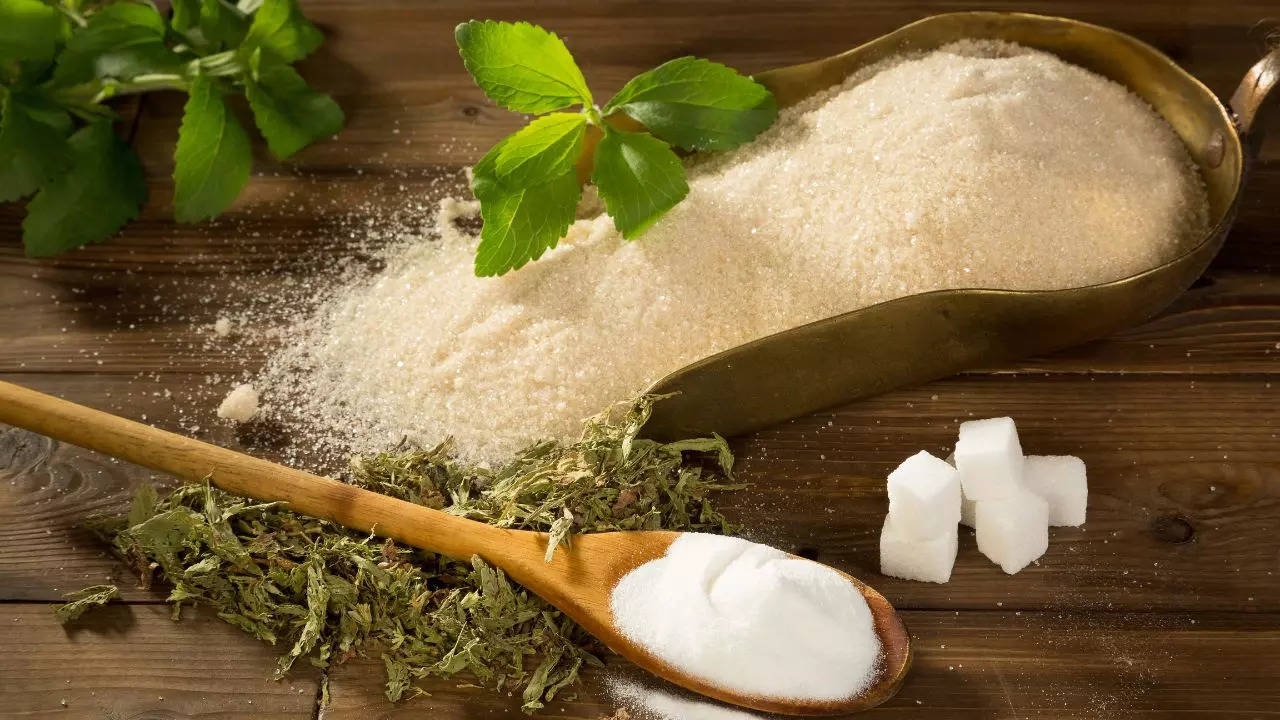A new study published in the European Heart Journal highlights potential health risks associated with xylitol, a widely used sugar substitute. Researchers from the Cleveland Clinic have discovered that xylitol may be linked to an increased risk of heart attack, stroke, and cardiovascular-related deaths.

Also Read: FDA Approves Moderna’s mRNA RSV Vaccine for Older Adults
This Sugar Substitute is a sugar alcohol that naturally occurs in small amounts in fruits and vegetables and is also produced by the human body.
As an additive it is used extensively in sugar-free gum, candies, toothpaste and baked goods. Xylitol is particularly popular in products marketed as “low-carb,” “natural,” and “keto-friendly.”
It is favored for its ability to replicate the taste of sugar while offering 40% fewer calories, making it an appealing option for those looking to reduce their sugar intake.
The use of sugar substitutes like xylitol has surged over the past decade. This increase is largely driven by growing concerns over obesity rates and the desire to reduce sugar consumption without sacrificing sweetness.
This Sugar Substitute is one of several sugar alcohols that have become staples in the food industry especially in products targeted at health-conscious consumers and those with dietary restrictions.
The Cleveland Clinic study, led by Dr. Stanley Hazen, chair of cardiovascular and metabolic sciences at the Lerner Research Institute involved more than 3,000 participants who were monitored for their levels of naturally occurring xylitol in the blood.
The participants were observed after overnight fasting to ensure accurate measurements. Those in the top 25% of xylitol levels had approximately double the risk of heart attack, stroke, or cardiovascular-related death over the next three years compared to those in the lowest 25%.
3,306 adults participated in the study providing a huge sample size for the analysis. Participants with the highest xylitol levels were found to be at a twofold increased risk for cardiovascular events within three years.
The researchers conducted additional experiments involving both human and animal subjects. Xylitol was fed to mice, added to blood and plasma samples in the lab and given as a drink to 10 healthy volunteers.
In each case, xylitol appeared to activate platelets, which play a crucial role in blood clotting. Platelets are essential for stopping bleeding but when they become overly active, they can form clots inside blood vessels leading to heart attacks and strokes.
Mice injected with xylitol experienced faster clot formation in their veins. After consuming xylitol-sweetened water, volunteers exhibited a 1000-fold increase in blood plasma xylitol levels and their platelets showed an increase in clotting propensity within 30 minutes.
This study follows previous research by the same team that identified similar cardiovascular risks associated with erythritol, another popular sugar substitute.
Last year, the Cleveland Clinic team linked erythritol to an increased risk of heart attack and stroke.
Individuals with diabetes, high blood pressure or elevated cholesterol, who are most likely to use sugar substitutes may be at higher risk. Given the potential risks, Dr. Hazen advises caution and recommends limiting intake of xylitol and other sugar alcohols.
While the study presents compelling evidence of an association between xylitol and increased cardiovascular risk, it is important to note its limitations.
Also Read: First Human Case of H5N2 Bird Flu Reported in Mexico, WHO Confirms
The research was observational and does not establish causality. The study participants were primarily individuals at high risk for or already diagnosed with heart disease, which may limit the generalizability of the findings to healthier populations.
Experts recommend a cautious approach to the consumption of sugar substitutes. While the occasional use of Sugar Substitute-containing toothpaste or gum is unlikely to pose risks.
Use modest amounts of natural sweeteners such as sugar, honey or fruit to sweeten food. Focus on incorporating high-quality dietary components like vegetables and fruits, which contain natural sugars into your diet.
Dr. Stanley Hazen, the senior author of the study and director of the Center for Cardiovascular Diagnostics and Prevention at the Cleveland Clinic Lerner Research Institute explained the surprising results, “We gave healthy volunteers a typical drink with xylitol, and their levels shot up 1,000-fold,”
“When you consume sugar, your glucose levels might rise by 10% or 20%, but not by a thousand times,” he added.
Hazen addressed that human exposure to such high levels of xylitol is a relatively recent phenomenon only emerging in the past few decades due to the rise of processed foods with sugar substitutes.
The study suggests that xylitol could be linked to cardiovascular risks including the formation of blood clots that can lead to heart attacks and strokes.
This research follows a 2023 study by the same team that found similar risks associated with another low-calorie sweetener, erythritol.
Dr. Matthew Tomey, a cardiologist at Mount Sinai Fuster Heart Hospital in New York City who was not involved in the study, acknowledged the importance of these findings but cautioned that further research is needed to confirm whether platelet behavior changes are directly responsible for the increased cardiovascular risk.
Also Read: Ozempic Reduces Risk of Death from Diabetes and Kidney Disease
“These experiments are intriguing but do not, on their own, establish that the abnormalities in platelet function account for the linkage between xylitol and adverse clinical events,” he said.
The potential link between xylitol and heart problems is particularly concerning given the rising rates of cardiovascular disease in the United States.
The American Heart Association predicts that by 2050, 61% of American adults will have some form of cardiovascular disease.
Cardiologists often use treatments to reduce clotting activity such as prescribing aspirin or drugs like clopidogrel (Plavix).
“These sugar alcohols seem to enhance platelet activity, which is troubling,” said Dr. Andrew Freeman, director of cardiovascular prevention and wellness at National Jewish Health in Denver.
Freeman suggested that consumers might need to reconsider their use of sugar substitutes like xylitol. “This is yet another reason to opt for water, with unsweetened tea or coffee as the next best choices,” he advised.
This Sugar Substitute is commonly found in a wide range of products from sugar-free gum to toothpaste and mouthwash, as well as in certain foods like candy, baked goods, and even some syrups and condiments.
Carla Saunders, president of the Calorie Control Council argued that the study’s results contradict decades of research supporting the safety and efficacy of xylitol and similar low-calorie sweeteners.
This Sugar Substitute is a sugar alcohol found naturally in small amounts in certain fruits and vegetables such as cauliflower, eggplant, and berries.
The quantities present in these natural sources are minuscule compared to the amounts used in commercial products. “It would take an enormous quantity of fruit to match the xylitol content of a single diabetic cookie,” Hazen said.
For commercial purposes, xylitol is typically produced from sources like corncobs and birch trees or synthesized using genetically engineered bacteria.
It is often marketed as a natural sweetener and touted for its low glycemic impact making it popular among those following low-carb or keto diets.
The U.S. Food and Drug Administration (FDA) classifies xylitol and other sugar alcohols as “generally recognized as safe” (GRAS).
This classification has led to the use of xylitol in food products as a cheaper alternative to cane sugar. Some beverages containing xylitol may have as much as 30 grams per serving and xylitol is available in bulk for home cooking as a sugar substitute.
The new study published in the European Heart Journal aimed to identify chemicals in the blood that could predict cardiovascular events like heart attacks and strokes.
By analyzing over 1,100 blood samples from individuals assessed for heart disease and more than 2,000 additional samples from high-risk individuals, the researchers found that higher levels of xylitol and other sugar alcohols were associated with increased cardiovascular risk.
Also Read: Fish Oil Supplements May Increase Risk of Stroke and Heart Issues
























